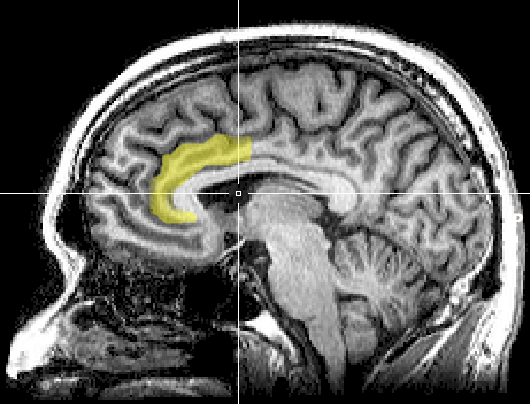Therapists and guidance counsellors are, by the very nature of their job, compassionate and empathetic. There are even branches of therapy that focus particularly on creating the most compassionate environment as possible.
But this characteristic of therapy could just make therapists and psychologists more prone to harm from sociopaths, people who by definition thrive on their disregard for the rights and feelings of others.
However, therapists and professional counsellors aren’t the only ones who are empathetic. In fact, you can take a test here to find out if you yourself fit the bill.
(Spoiler: All of us do to some degree.)
Indeed, empathy is a universal human trait, something built into parts of a healthy functioning human’s brain.

The anterior cingulate cortex region of the brain, where empathy is processed.
And that means that we all are, to varying degrees, targets for those who exhibit sociopathic behaviour.
It’s hard to escape the emotional grasp of a sociopath after all; part of what makes sociopaths so ‘effective,’ is the way in which they select their victims.
As reported by Psychology Today, you need to be aware of attempts made by the sociopathic individual to test how empathetic and submissive (I’m not suggesting the two are linked) you are.
Pay attention for someone trying to size you up in a very dominant or cold, nonchalant fashion; whether or not this person is a sociopath is up for a psychologist to decide but you certainly wouldn’t want to be around someone like that regardless.
Also be aware of being drawn in by an individual with flattery, bribery and often outright lies.
And just why should you be so weary of sociopaths? Well, while they only make up 1% of the general population, they make up for 25 times that of the prison population, committing an incredible amount of violent crimes.

Ted Bundy, sociopath and serial killer.
But despite what common ‘knowledge’ might have you believe, not all victims of sociopaths are necessarily victims of murder or even physically violent crimes.
Rather, techniques of manipulation and dominance can be much more covert in the way they damage and seep into the lives of those affected. These can include:
- Blame:
Sociopathic people tend to paint a very different picture from reality when it comes to an accurate description of who’s responsible for things going wrong in relationships.
- Threats:
Sociopathic people frequently threaten those close to them with bodily harm or things such as taking children away.
- Guilt:
When intimidation fails, sociopathic people may change their tactics and try to put on a display of being hurt or even crying to win the sympathy of their victim. Remember, they’ve preyed on you because you’re empathetic and likely to respond to this sort of thing.
Now, I don’t list those three characteristics to give you license to go around diagnosing people – that should be left to a trained professional, as diagnosing someone with a mental disorder takes far more than checking off boxes.
I mention those to you as potential warning signs that sociopathy may be something you’d like to consider as an option if someone around you has been giving you reason to suspect that sort of thing.
And there is plenty of help available if you are, in fact, a victim of a sociopath. Website Love Fraud is one such resource, as are the following:
The good news is that there is also plenty of help available if you wish to focus on developing healthy relationships in the future. Here’s one such article that might be a good place to start if you’d like to spot signs of what a healthy relationship looks like.
The fact that you are empathetic is something you should be proud of. It makes you a caring and loving individual capable of doing much good in the world. But unfortunately, you also need to keep an eye out for those who might take advantage of that – particularly sociopaths.


